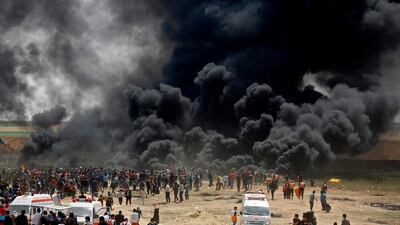As Israel marks 70 years since its foundation, there is a need for it to resolve its most fundamental contradiction: is it willing to accept universal principles of justice, freedom and equality for all or is it going to continue its discriminatory policies against its non-Jewish citizens in all fields of life?
The Nakba ("catastrophe" in Arabic) of 1948, when about 750,000 Palestinians were expelled from their homes in what became Israel, marked the beginning of a process of systematic denial of Palestinian rights and is the most traumatic event in the collective history of the Palestinian people.
This is not only about millions of refugees who are being denied their legal right to return home or about Palestinians in the occupied West Bank and Gaza, who have lived under brutal Israeli military rule for more than 50 years, their lands systematically stolen for Israel's illegal settlement enterprise. It is also about the Palestinian citizens of Israel that today represent more than 20 per cent of the population but who are treated as second and third class citizens in the land of their ancestors.
When Israel was established in 1948, Palestinian Arab citizens owned close to 90 per cent of the land of the state. Seventy years later, after decades of Israel expropriating our land for the use of Jewish citizens, Arab citizens only own around 3 per cent of the land. Much of the land that was taken from us after 1948 is now controlled, among others, by the Jewish National Fund, a quasi-governmental agency which systematically discriminates against non-Jews. There are several communities in Israel where Arab citizens are not allowed to live. Imagine what would happen if Jewish citizens of the United States were barred from certain communities in that country on the basis of their religion?
In 1948, at least 418 Palestinian towns and villages were ethnically cleansed, destroyed in their entirety or repopulated with Jewish Israelis. Many Palestinians who were forced from their homes became internally displaced and eventually obtained Israeli citizenship, although they would be ruled by martial law until 1966. Today many of them live only a few miles from the towns their families are from but Israel prevents them from even harvesting the trees planted by their own ancestors. That is one of the reasons why, instead of "celebrating independence", we participated earlier this month in the "march of return", when thousands of Palestinian citizens of Israel go back to their original villages, or to what is left of them.
In response to our commemorating the collective trauma suffered by the Palestinian people in 1948, the Israeli government has attempted to use legislation to suppress efforts to mark the Nakba, part of a macro effort to strip us of our national identity. Even the term "Arab-Israeli" is a euphemism created in order to make the term "Palestinian" disappear. There are more than 60 laws approved by the Israeli parliament that discriminate against the non-Jewish population. The current government, the most extreme in 70 years, is pushing for the Nationality Law to be approved, which would formalise the fact that Israel is intended to be a state for Jews only.
_________________________
Read more from Opinion:
Israel's tactic of bulling its critics is unravelling
A new Cold War between the US and China would be a grave mistake
_________________________
Regretfully, most of the international community has opted to ignore the plight of the Palestinian citizens of Israel while continuing to treat Israel as if it were a democracy and a state above the law. For example, as the Palestinian village of Umm Al Hiran in southern Israel is being demolished so that Israel can build a Jewish town in its place, our calls for help have been met with silence by European and US representatives.
This year, to add insult to injury, the Trump administration – which has close ties to Israel's hardline right-wing government and settler movement – has decided to mark the Nakba by moving its embassy from Tel Aviv to Jerusalem, in contravention of decades of US policy and international law. Today, the two-state solution has been turned into the "two-state illusion".
As Israel turns 70, across the land of historic Palestine there are 6.8 million Palestinian Christians, Druze and Muslims and 6.5 million Israeli Jews. What is Israel planning to do in the long run – another massive ethnic cleansing campaign like the one in 1948? If not a two-state solution, the only other challenging options left for Israel are to accept a single democratic state with equal rights for all its citizens, regardless of their race or religion, or to continue its efforts at normalising the apartheid regime it has implemented in the territories it controls between the Jordan river and the Mediterranean Sea.
Despite the claims of its supporters, Israel has never been a true democracy. From 1948 until 1966, it ruled over large numbers of its own Palestinian citizens using martial law and from 1967 until today, millions of Palestinians in the occupied territories have lived under Israeli military rule.
Whether Israel actually ever becomes a democracy or continues to develop into an apartheid state that systematically privileges one group of people based solely on their religion/ethnicity will be determined by the willingness of Jewish Israelis to accept universal principles of equality, freedom and dignity for all. But before we can move forward to this brighter future, they must first acknowledge the past.
Dr Ahmad Tibi is the deputy speaker of the Knesset. He represents the Arab Joint List, the third largest political party in the Israeli parliament

